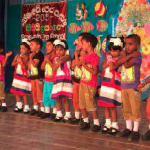In: Den Haag Centraal – april 2019
www.denhaagcentraal.net
Goed dat misstanden nu aan de kaak gesteld worden, maar we moeten niet doorslaan door maar één soort zorg voor kinderen in ontwikkelingslanden te bepleiten. Dat lukt hier ook niet, stelt deskundige Philip Veerman.
 Toen in 2004 door de tsunami kinderen in Sri Lanka zonder familieleden kwamen te zitten, zette de Haagse Marja van Leeuwen zich in om daar een weeshuis te bouwen. Dit project wordt ondersteund door de Stichting Weeshuis Sri lanka te Den Haag. Het kindertehuis wordt gerund door een lokale staf. Geld van de stichting helpt voor salarissen van leraren, bijlessen en de tandarts. Volgens een recente discussie zou zo’n stichting maar beter opgedoekt kunnen worden en zou zo’n weeshuis moeten sluiten. Voor de goede orde: dit is een discussie die is aangezwengeld in de Tweede Kamercommissie Buitenlandse handel en Ontwikkelingssamenwerking. Daar werd de initiatiefnota van VVD-Kamerlid Wybren van Haga behandeld waarin hij voorstellen ontvouwt tegen weeshuistoerisme. Op 8 april was er nota-overleg met de minister.
Toen in 2004 door de tsunami kinderen in Sri Lanka zonder familieleden kwamen te zitten, zette de Haagse Marja van Leeuwen zich in om daar een weeshuis te bouwen. Dit project wordt ondersteund door de Stichting Weeshuis Sri lanka te Den Haag. Het kindertehuis wordt gerund door een lokale staf. Geld van de stichting helpt voor salarissen van leraren, bijlessen en de tandarts. Volgens een recente discussie zou zo’n stichting maar beter opgedoekt kunnen worden en zou zo’n weeshuis moeten sluiten. Voor de goede orde: dit is een discussie die is aangezwengeld in de Tweede Kamercommissie Buitenlandse handel en Ontwikkelingssamenwerking. Daar werd de initiatiefnota van VVD-Kamerlid Wybren van Haga behandeld waarin hij voorstellen ontvouwt tegen weeshuistoerisme. Op 8 april was er nota-overleg met de minister.
Misstanden
Voor sommige weeshuizen in Uganda gaan ronselaars op pad om in de dorpen arme alleenstaande moeders te overtuigen dat kinderen beter af zijn in een weeshuis. Ook zijn er weeshuizen die draaien op vrijwilligers uit het buitenland (vandaar de term ‘weeshuistoerisme’). Als kinderen zich aan vrijwilligers hechten, gaan die na een tijd weer terug en moeten kinderen weer een teleurstelling incasseren. Voor sommige malafide ‘ondernemers’ zijn kinderen een bron van inkomsten. Antropologe Kristen Cheney van het Institute for Social Studies in Den haag noemde dit het ‘orphan industrial complex’. Door vrijwilligers te sturen hou je alles in stand. De weg naar misstanden is geplaveid met goede bedoelingen.
Hoorzitting
In de Tweede Kamer werden een gezinspedagoog, een antropoloog en een Australische juriste gehoord. Daarna spraken vertegenwoordigers van vier niet-gouvernementele organisaties. Opvallend was dat niemand was uitgenodigd om te spreken voor organisaties die werken ten behoeve van weeshuizen. in de hoorzitting kwamen uitwassen duidelijk uit de verf. De door Joanne Rowling (de schrijfster van de Harry potter-boeken) opgerichte LUMOS Foundation heeft zich nu ook in de strijd gegooid. een medewerker van de foundation in Londen schreef mij dat het fonds ‘overal verandering probeert te bewerkstelligen in het hele kinderbeschermingssysteem. Wij willen aantonen dat vormen van gezinszorg te verkiezen zijn (maar natuurlijk zijn die ook niet perfect)’.
Haagse weeshuizen
Ook in nederland zijn wij afhankelijk geweest van weeshuizen. In 1564 werd bijvoorbeeld het Haags Weeshuis opgericht. Er kwamen een Hervorm Weeshuis, een Joods Weeshuis een een R.K. Weeshuis (later bekend als Groenestein, berucht door misbruik dat boven water kwam). Andere vormen von “residentiële zorg (zoals internaten) ontstonden. In de tijd dat weeshuizen zijn gestart, werden er ook kinderen opgevangen in gezinnen. In 1779 heeft een eerbiedwaardig gezelschap in Hamburg zelfs een prijs uitgeschreven welke vorm de voorkeur verdiende: ‘uitbesteden’ van kinderen (in pleeggezinnen) of plaatsen in weeshuizen. Dat was geen uitgemaakte zaak. Er waren namelijk problemen met gezinnen. Sommige kinderen werden ingezet als goedkope arbeidskracht en er werden kinderen misbruikt. De vraag ‘internaat of pleeggezin’ heeft de jeugdbescherming lange tijd gedomineerd. Daarna ontstond een staalkaart van bijvoorbeeld hulp aan gezinnen thuis, pleeggezinnen, halfwegvoorzieningen, internaten en begeleide kamerbewoning.
Geen monocultuur
Een juist uitgangspunt vond ik dat de sprekers in de Tweede Kamer het eens waren dat kinderen zich moeten kunnen hechten. Gezinspedagoog Rien van IJzendoorn stelde in de Kamer dat opgroeien in weeshuizen ‘per definitie eigenlijk structurele verwaarlozing is’. maar , niet alle weeshuizen draaien met wisselende diensten (het weeshuis waarvoor Marja van leeuwen geld verzamelt, heeft ‘huismoeders’, alleenstaande vrouwen op zes tot acht kinderen). In Nederland lukt het ons ook niet om alle kinderen in gezinnen te plaatsen. Wat niet helpt, is dat wij pleegouders geen salaris geven, slechts een bescheiden vergoeding. Pleegzorg is nu vaak ondergebracht bij wijkteams (voor jong tot oud), waardoor deskundigheid van het begeleiden van pleeggezinnen verloren dreigt te gaan . Onze jeugdzorg is geen modelvoorbeeld voor de export. Wat het buitenland betreft: goed om te voorkomen dat vrijwilligers naar malafide instellingen gaan, maar door alle instellingen over één kam te scheren, schieten we door
Dr. Philip Veerman is gz-psycholoog en kinderrechtendeskundige te Den Haag. In 1981 verscheen van Bernhard Kruithof, Tom Mous en Philip Veerman (redactie) ‘internaat of pleeggezin: 200 jaar discussie’.